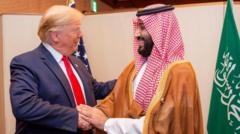President Trump's upcoming visit to the Gulf aims to secure significant investments from Saudi Arabia and other nations to bolster the US economy, amidst challenges such as import tariffs and declining foreign direct investment. The trip includes meetings with leaders and a high-profile investment forum, highlighting the intertwined economic interests of the US and Gulf states.
Trump Aims to Secure Gulf Investments for US Economy During Middle East Visit

Trump Aims to Secure Gulf Investments for US Economy During Middle East Visit
As President Trump prepares for a trip to Saudi Arabia and other Gulf states, he seeks substantial investments from these nations to support his economic agenda and job creation efforts.
US President Donald Trump is set to embark on a pivotal trip to the Gulf region, with an emphasis on acquiring substantial investments from wealthy nations to bolster the US economy. The upcoming meetings and forums are geared towards showcasing potential collaboration, particularly in areas that align with Trump's economic policy of "America First."
Trump's first destination will be Riyadh, where he will meet with Crown Prince Mohammed bin Salman, marking the Saudi capital as significant for his approach to foreign relations. Following his visit to Saudi Arabia, the president will attend a summit of Gulf leaders before making stops in Qatar and the United Arab Emirates (UAE).
Economist Karen Young from the Middle East Institute notes that Trump desires to announce major Gulf investment backings which could be visually represented during his meetings, emphasizing their role in job creation and domestic manufacturing strategies. The regional visit is underscored by its historical context; Saudi Arabia was Trump's inaugural stop during his first presidential term in 2017.
This trip will congregate influential figures from Wall Street and Silicon Valley at a Saudi-US investment forum, featuring CEOs from major firms like BlackRock, Citigroup, and IBM. The urgency for these discussions comes as Trump's economic policies face scrutiny, notably due to tariffs that have led to disruptions in trade and a decline in US economic output.
Notably, Prince Mohammed previously announced a commitment of $600 billion in investments, yet Trump is reportedly hoping to escalate this to $1 trillion by including military purchases. Ali Shihabi, a commentator with close ties to the Saudi government, suggests that various economic agreements could be solidified during this visit, effectively integrating the economies of the US and Saudi Arabia further.
Saudi Arabia's sovereign wealth fund already holds significant stakes in American companies such as Uber and is projected to increase its influence through further investments. In a similarly ambitious vein, the UAE has pledged to infuse $1.4 trillion into the US over the next decade, eyeing sectors like artificial intelligence and manufacturing.
While Trump’s administration welcomes this financial partnership, experts urge caution in expectations, anticipating that many of these investments are long-term strategies rather than immediate gains. Potential military deals valued at over $100 billion are also anticipated, rekindling arms procurement discussions that slowed under the previous administration.
Artificial intelligence is another critical focus, as both Gulf nations aspire to develop robust tech sectors and strengthen their access to advanced American technologies. Efforts are underway to streamline procurement processes for military equipment, which Shihabi asserts will improve during the Trump administration.
Additionally, while Trump aims to court investment for the US, Saudi Arabia seeks to enhance American involvement in its ambitious Vision 2030 initiative—an effort to diversify its economy beyond oil. Unfortunately, this comes against the backdrop of declining foreign investments and fluctuating oil prices, prompting urgency to secure international capital for vast construction and infrastructure projects.
As the US-Saudi Business Council pushes for enhanced business ties, the visit represents a dual opportunity: for Saudi Arabia to reaffirm its alliance with a historical partner and for Trump to showcase successful negotiations resulting in financial commitments that bolster his economic platform.





















